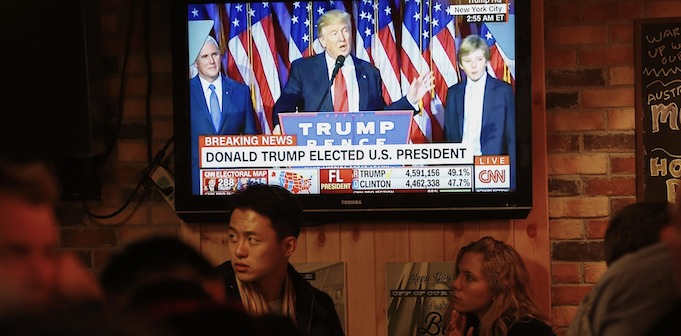
Bar patrons watch a news broadcast of US presidential election results in Beijing, China. Source: EPA/Rolex Dela Pena
By Giovanni Di Lieto, Monash University
Donald Trump’s victory promises a further departure from the traditional Asia-Pacific order created during the Cold War years. This was when the US provided military and economic dominance through a system of defence alliances with the major trading partners in the region, including Australia.
The old Asia-Pacific order was based on the exchange of security for free trade. With the demise of the Soviet Union and the rise of China’s market economy, the Asia-Pacific order is now in an evolutionary phase.
Now the hierarchy of countries is splitting between security, still dominated by the US, and the economic order, which is being overtaken by China.
In the middle of this competition between the US and China, there are the Asia-Pacific countries dealing with China for economic gains without giving away American security patronage. Japan and Australia best exemplify these countries.
For example, both are negotiating the Trans Pacific Partnership and the Regional Comprehensive Economic Partnership, while keeping vast numbers of US troops and nuclear armaments on their soils. Both clearly benefit from the status quo and don’t wish for the day to come when they have to choose a bundled security-economic dependency with either the US or China, in Cold War-like dynamics.
The stability of the current dual order between the US and China depends first and foremost on the US ability and willingness to provide its Asia-Pacific allies with a security bulwark against destabilising actors (for example, North Korea, ISIS, and the various nationalistic forces). Trump’s isolationist foreign policy may put an abrupt end to this dynamic.
On the other hand, it’s still not clear whether China is going to be satisfied with economic dominance alone and with its current geopolitical restraint with its trading partners in the region. China may soon gradually use its trade and investment might to push smaller Asian countries away from their strong bilateral security ties with the US, in exchange for tighter multilateral economic cooperation.
The perfect example of this new dynamic is the recent alignment of the Philippines with China. Philippines President Rodrigo Duterte claimed that “America has lost” both militarily and economically.
China’s elites have long held the view of the US as a declining power and China as its natural heir in the region. Long-established research in political science and economics shows countries rise as they use asymmetric trade relations to turn economic dominance into a military dominance for geopolitical gains.
China’s world trade policy is to assert regional leadership to integrate and upgrade in the global economy. China will eventually seek to translate this trade leadership into regional security and then political dominance also at a global level, as the Asia-Pacific region carries the bulk of world economic growth.
However, there is an increasing co-dependency between China and other countries in trade dynamics, particularly in the natural resources sector and in foreign direct investments tied to global supply chains.
On the one hand, this co-dependency restrains China from an exceedingly aggressive foreign policy, but on the other hand it is pushing China’s strategic interests out of the Asia-Pacific regional shell. In fact, as early as November 2014, China’s President Xi Jinping openly advanced the idea of a “major-power diplomacy with Chinese characteristics”. In other words, to secure national interests with a more assertive foreign policy reflecting China’s rising economic power.
With Trump’s victory, and also considering the recent issues in the South China Sea, it would be hard to believe that China is going to be satisfied in a dual order under the US security umbrella. The ultimate issue is whether China will decide to pursue hardline policies to push the US outside of Asia in the short term, or instead patiently wait for the US to naturally recede from the region as its economic power wanes.
Before Trump’s victory, there was reason to believe that Xi Jinping and the Chinese government would opt for the latter option. This was because it’s not in China’s best economic interest to ignite geopolitical tensions in Asia, especially as the American retreat may lead Japan to reinstate a significant military capability.
As China currently benefits from a stable, open and secure system of free trade, Trump’s trade protectionist agenda may instead push China towards hardline foreign policies. This would compel its co-dependent trading partners like Australia to soon make a clear choice between the US and China.![]()
Giovanni Di Lieto is a lecturer in international business in the Monash Business School at Monash University.
This article was originally published on The Conversation. Read the original article.


COMMENTS
SmartCompany is committed to hosting lively discussions. Help us keep the conversation useful, interesting and welcoming. We aim to publish comments quickly in the interest of promoting robust conversation, but we’re a small team and we deploy filters to protect against legal risk. Occasionally your comment may be held up while it is being reviewed, but we’re working as fast as we can to keep the conversation rolling.
The SmartCompany comment section is members-only content. Please subscribe to leave a comment.
The SmartCompany comment section is members-only content. Please login to leave a comment.